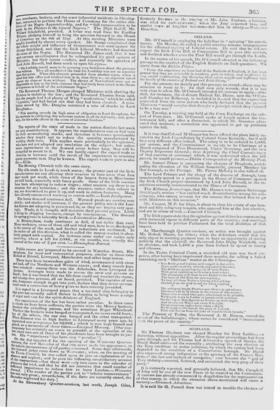The reports of the state of trade in the cotton
districts last week are very unsatisfactory. It appears the manufacturers cameo find vent for their accumulating stocks, and therefore it becomes questionnble whether they ought not to reduce the quantity manufactured by working short time. This applies more particularly to the spinners, whohave not yet adopted any resolation on the subject ; but unless sonic improvement in the demand occur before long, they will be
compelled to resort to it. We can hardly expect the export trade to America to increase until the restilt of the experiment in resuming specie payments next May be known. The export trade in yarn is also flat—Glebe- The Morning Chronicle tells the same story.
The silk-trade in Leeds is much worse ; the greater part of the Hole manufacturers are tint allowing their weavers to have more than four days' work per week, while three of the largest firms in Manchester are still brisk, especially with fancy goods. Some of the little masters hare been attempting to reduce wages ; other masters say there is no occasion for any reduction ; and the weavers, rather than submit to any, are determined to give it up, and work in cotton-factories. Many hoe already commenced work Mg in cotton- mills.—Leeds Intelligencer.
The home demand continues dull. Worsted goods are moving very slowly; and stocks will increase, if the present policy which the Lon- don houses are adopting is persevered in, as they tire buying very spar- ingly. Wools, it is thought, will netintain their present prices. Little is doing in shipping business, except by consignment. 'fhe demand for spring gloves is tolerably brisk.—Leicestershire Mercury.
In Birmingham, trade continues as dull, if not duller than ever.
Many workmen, some of them old and tried men, have been discharged in the course of the week, and further reductions are meditated. In
the midst of all this distress, what is called the money-market is abso- lutely gorged with capital. An instance came under our notice only yesterday, where a bill for 2,000/., at six months, was atonally dis- counted at the rate of 2 per cent. ! —Birmingham Journal.






















 Previous page
Previous page